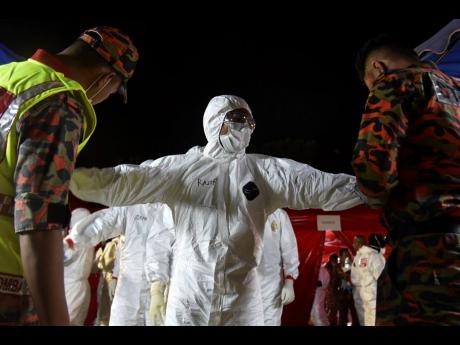Globe braces for long battle against virus
SEOUL (AP):
Scientists raced to find a treatment, crews scrubbed everything from money to buses, and quarantines were enforced Wednesday from a beachfront resort in the Atlantic to an uninhabited island in the Pacific as the world fought the spread of a new virus.
Worries over the ever-expanding economic fallout of the COVID-19 crisis multiplied, with factories idled, trade routes frozen, and tourism crippled, while a growing list of countries braced for the illness to claim new territory. Even the Olympics, five months away, wasn’t far enough off to keep people from wondering if it would go on as planned.
“We don’t expect a miracle in the short term,” said Kianoush Jahanpour of the health ministry in Iran, where an official tally of infections of 139 was doubted by some who thought the problem was far bigger.
About 81,000 people around the globe were sickened by the coronavirus that kept finding new targets.
In Europe, where Germany, France and Spain were among the places with a growing caseload, an expanding cluster of more than 200 cases in northern Italy was eyed as a source for transmissions. In the Middle East, where cases increased in Bahrain, Kuwait and Iraq, blame was directed towards Iran. In Asia, where the crisis originated late last year in China, threats continued to emerge around the region, with South Korea battling a mass outbreak centred in the 2.5 million-person city of Daegu.
Though the virus pushed into countries both rich and poor, its arrival in places with little ability to detect, respond and contain it brought concern it could run rampant there and spread easily elsewhere.
“We’re going to be trying to slow down the spread so that our hospitals are not overwhelmed in one big gulp, one big hit,” said Ian Mackay, who studies viruses at the University of Queensland in Australia.
In South Korea, workers sanitised public buses, while in China, banks disinfected banknotes using ultraviolet rays. In Germany, authorities stressed “sneezing etiquette”, while in the United States, doctors announced a clinical trial of a possible coronavirus treatment.
Around the world, as Christians marked the start of the holy season of Lent with Ash Wednesday, worshippers found churches closed and rituals changed by virus fears. Even in St Peter’s Square, many of those gathered for Pope Francis’ weekly audience wore face masks and clergy appeared to refrain from embracing the pontiff or kissing his ring.

